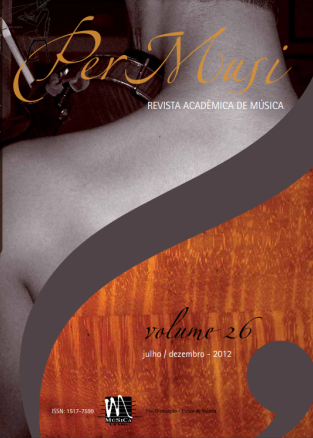La ampliación del concepto de cadencia a la repertorio post-tonal
Palabras clave:
Cadencias en la música, Terminología musical, Armonía, Análisis musical, Post-tonalidadResumen
Toma el concepto de cadencia, un tópico del campo de la armonía, con un doble objetivo: reflexionar sobre el uso de la terminología musical, exponiendo una cierta falta de consenso observada entre los autores brasileños, y ejemplificar la permanencia del concepto de "cadencia" en el repertorio post-tonal. Comienza con una revisión histórica/conceptual del tema, investigando cómo se trata en los libros seleccionados, sus puntos de contacto y divergencia, sugiriendo, al final, una aproximación para la clasificación de las progresiones de acordes. A continuación, a partir de estos conocimientos, pretendemos extender la idea de la función cadencial al repertorio no tonal, ejemplificado con progresiones finales y artificios tónicos en obras del siglo XX.
Referencias
BENEDICTIS, Savino de. Terminologia Musical. São Paulo: Ricordi, 1970.
BENNETT, Roy. Forma e Estrutura na Música. Trad. Luiz C. Csëko. Rio de Janeiro: Jorge Zahar, 1986.
BRISOLLA, Cyro M. Princípios de Harmonia Funcional. São Paulo: Novas Metas, 1979.
BRISOLLA, Cyro M. Princípios de Harmonia Funcional. Revisado e ampliado por Mario Ficarelli. São Paulo: Annablume, 2006.
CARRETER, Fernando L. Diccionario de términos filológicos. Madrid: Editorial Gredos, 1973.
DANHAUSER, A. Théorie de la Musique. Paris : Editions Henry Lemoine, 1996.
DOUÉ, Jean. Étude Technique et Stylistique de L’Harmonie. Paris: Gérard Billaudot Ed., 2005.
GREEN, Douglass M. Form in Tonal Music. New York: Holt, Rinehart and Wiston, 1965.
HINDEMITH, P. Curso Condensado de Harmonia Tradicional. Trad. Souza Lima. São Paulo: Irmãos Vitale, s.d.
KOSTKA. Stefan & PAYNE, Dorothy. Tonal Harmony. Boston: McGraw-Hill, 2000.
OLIVEIRA, José Zula de & OLIVEIRA, Marilena de. Harmonia Funcional. São Paulo: Cultura Musical, 1978.
OWEN, Harold. Modal and Tonal Counterpoint. New York: Schirmer Books, 1992.
PERSICHETTI, Vincent. Twentyeth Century Harmony. New York, W. W. Norton, 1961.
PISTON, Walter. Armonía. Cooper City: Span Press Universitaria, 1998.
RAMEAU, Jean-Philippe. Treatise on Harmony. New York: Dover, 1971.
SCHOENBERG, Arnold. Harmonia. Trad. Marden Maluf. São Paulo, Edunesp, 2001.
SÉPE, João. Tratado de Harmonia. São Paulo: Ricordi Americana, 1942
Descargas
Publicado
Número
Sección
Licencia

Esta obra está bajo una licencia internacional Creative Commons Atribución 4.0.

Excepto cuando se indique lo contrario, el contenido de este sitio está sujeto a una Licencia Creative Commons - Atribuição 4.0 Internacional.












